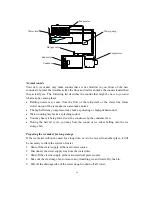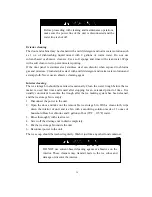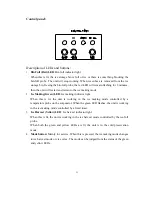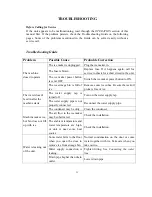
19
Condenser cleaning
A dirty or clogged condenser prevents proper airflow, reduces ice making capacity, and
causes higher than recommended operating temperatures that may lead to component
failure. Have the condenser cleaned at least once every six months.
1.
Unplug the ice maker or disconnect power.
2.
Gently pull off the
lower front louver.
3.
Remove dirt and lint from the condenser fins and the
unit compartment with the brush attachment of a
vacuum cleaner.
4.
Reassemble the
lower front louver.
5.
Plug in the ice maker or reconnect power.
Water distribution tube cleaning
When you find the ice cubes are incompletely formed or the output is low, the water
distribution tube may be blocked. Turn off the power button, rotate the water distribution
tube, locate the holes in the distribution tube and use a pointed object such as a toothpick
to dredge the holes. Then rotate the water distribution tube back to its original position. If
the tube is badly blocked, clean it as follows:
1.
Shut off the water supply
2.
Disconnect the water hose from the distribution tube.
3.
Lift the right side up, then remove the distribution tube.
4.
With a brush, clean the tube with a dilute solution of warm water and a mild detergent
such as dishwashing liquid. After removing the dirt and lint from the surface, rinse the
tube with clean water.
5.
Replace the distribution tube.
6.
Reconnect the water supply.
Ice-making system cleaning
Minerals that are removed from the water during the freezing cycle will eventually form a
hard, scaly deposit in the water system. Cleaning the system regularly helps remove the
mineral scale buildup. How often to clean the system depends upon how hard your water
is or how effective your filtration may be. With hard water of 15 to 20 grains/gal. (4 to 5
grains/ liter), you may need to clean the system as often as once every 6 months.
DO NOT touch the condenser fins. They are sharp and can be easily damaged.






































